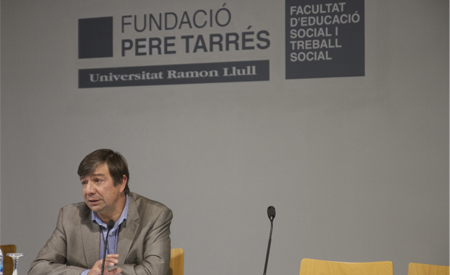José Antonio Sanahuja acknowledges at the URL that the new objectives of the global cooperation for development agenda are unrealistic

Thursday, 7 May 2015. The Eleventh Cooperation Conference of the University Ramon Llull (URL) took place today at the Pere Tarrés-URL Faculty of Social Education and Social Work.
The opening lecture of the event, entitled "From the Millennium Development Goals (MDGs) to the new post-2015 Development Agenda: What is the role of universities?" was given by José Antonio Sanahuja, researcher of the Complutense Institute of International Studies (Instituto Complutense de Estudios Internacionales, ICEI).
The event was organised as part of the Aristos Campus Mundus project, one strategic goal of which is to promote University Social Responsibility (USR).
Josep Maria Garrell, Rector of the URL, and Josep Oriol Pujol, General Manager of the Pere Tarrés-URL Foundation opened the conference. Speaking about the MDGs adopted in 2000 at the United Nations General Assembly (Millennium Declaration) Pujol stressed that "nobody honest and socially responsible can avoid the MDGs. Therefore today we are taking a break from our academic activity to reflect on a more human future."
The Rector of the URL stressed that the role of the university should be, on the one hand, "to generate unpoliticised debate to decide upon concrete measures to put to the political class" and, secondly, "to contribute to educating for a global awareness - understood as social justice."
José Antonio Sanahuja explained how the scenario has changed in the last 25 years and how now there are new realities, new redistributions of power among State actors, a privatisation of financing for development and, above all, a groundswell of commitment from emerging countries towards the role of international cooperation and development.
Sanahuja recalled that the MDGs "have been criticised for their technocratic, minimalist nature, for focusing on the symptoms and not the causes, for not making substantial changes, for being an agenda for the poor and not a comprehensive and universal agenda ", among other things.
Here, Sanahuja explained some of the paradoxes of the MDGs: "There is less inequality between countries but greater inequality among people. Inequality is not a national, but a transnational problem, with global causes and consequences, something that requires collective global and cooperative action."
Regarding the Sustainable Development Goals (SDG) - the new MDGs - Mr Sanahuja acknowledged that often many of the goals they raise are ethically unobjectionable but very difficult to achieve in a realistic way. "When I read all these goals I see they have left nothing out, but the result is inflated. There are 169 goals and I wonder how they can be applied in a practical and concrete way. I see a danger that each country may choose only the ones they are interested in, à la carte." Furthermore, he pointed out that developing countries are the ones with the most obligations, but are not receiving support from those who are better off.
The debate was opened with speeches by Montserrat Santolino, head of communication at the Catalan Federation of NGOs for the Development (Federació Catalana d’ONG per al Desenvolupament, FCONGD) and David Llistar, an expert in cooperation and member of the Debt in Globalisation Observatory (Observatori del Deute en la Globalització, ODG).
Ms Santolino insisted that the MDGs should be an issue that genuinely affects current policy: "I challenge everyone to go to Parliament and ask politicians what the MDGs and SDGs are: they do not know! There is neither conscience nor political education", she complained.
Mr Listar stressed that the MDGs were created to try to galvanise people into action, but that this has not happened. "The Spanish government used the narrative of the MDGs and SDGs as a kind of Valium effect to tranquillise the population." He added that "in Catalonia we have to see how we are going to reorganise the economy to adapt to the SDGs, in terms of security, immigration, our energy model .... "
The round table that followed, on "What are the challenges of the post-2015 Agenda and the new global context in the University?", involved the following experts: Marta Macias, Director of the Catalan Agency for Development Cooperation (ACCD); Andrea Costafreda, lecturer and coordinator of the International Relations Bachelor's degree from the Blanquerna-URL Faculty of Communication and International Relations and an expert in development; and Ignacio Martinez head of studies at the "Plataforma 2015 y más".
About the UNESCO-URL Chair and URL Cooperation Day
The Chair was set up to work using an academic cooperation model based on overarching personal training, research and knowledge transfer to promote an overall system of actions based on education, science and technology system in pursuit of one essential goal: the subject of the research must have a positive impact on human development.
To accomplish its objectives, the Chair produces publications and courses, a doctoral programme and organises forums for debate, including the Cooperation Day, which is in its eleventh year in 2015.
Traditionally, the URL Cooperation Day has aimed to raise awareness about the real situation of a country in order to promote strategic alliances and contribute to its development. It has covered El Salvador, Peru, Guatemala, Chile, Nicaragua, Bolivia, Mexico, Colombia and India. As 2015 was the closing year of the most important global development agenda ever and the opening of a new global political, social and economic agenda, it was decided to focus the eleventh edition on this issue with experts in the field.
Further documentation
More information:
Anna Tosca
Head of Press Office and Social Networks
Ramon Llull University
Tel. 936 022 228 | 692 671 597
atosca@rectorat.url.edu | twitter.com/uramonllull
You may also be interested in


Esade’s program cements its spot in the world’s top 10 for the second year running and stands out in Europe for salary percentage increase, carbon footprint reduction and classroom diversity



